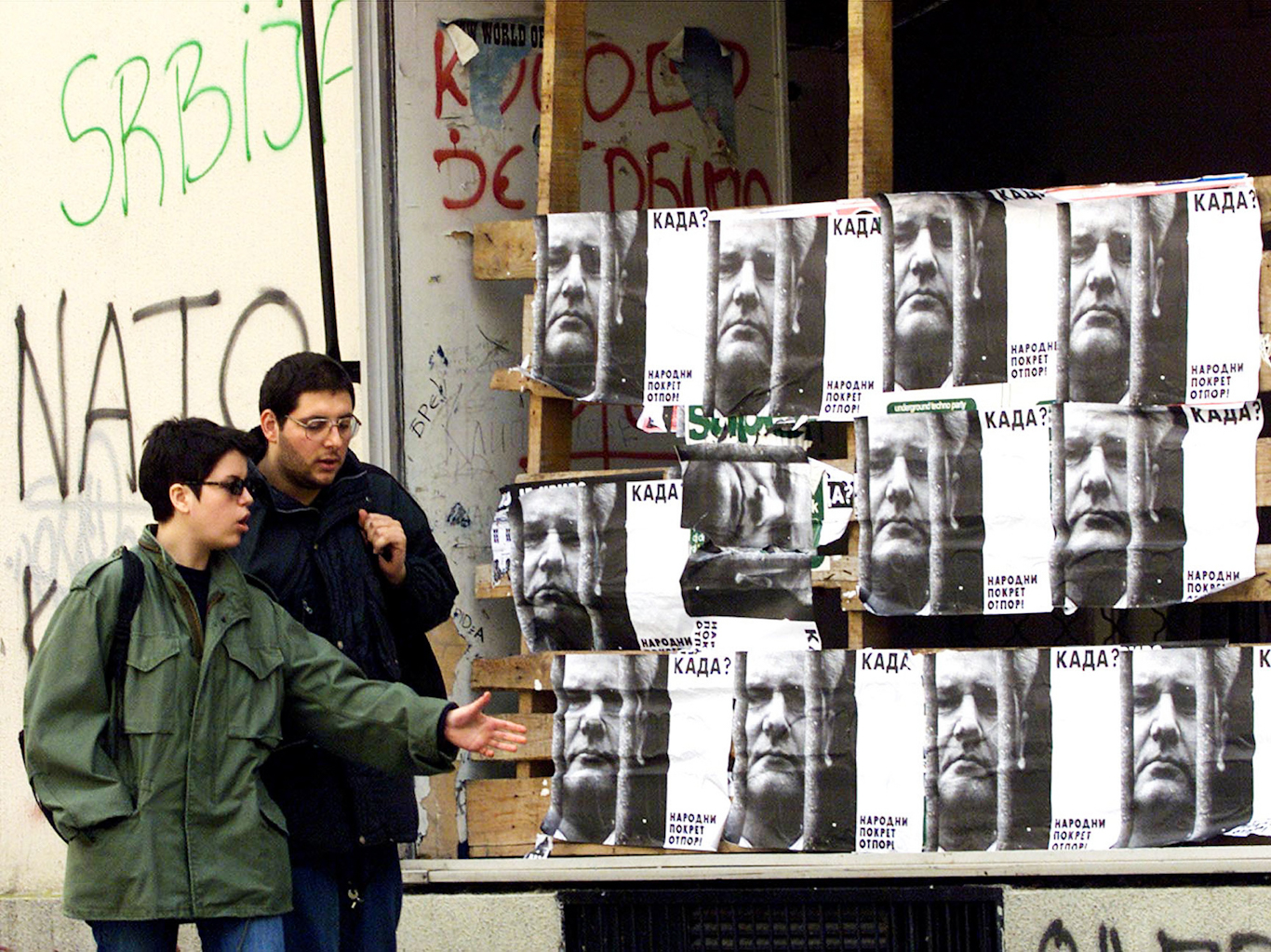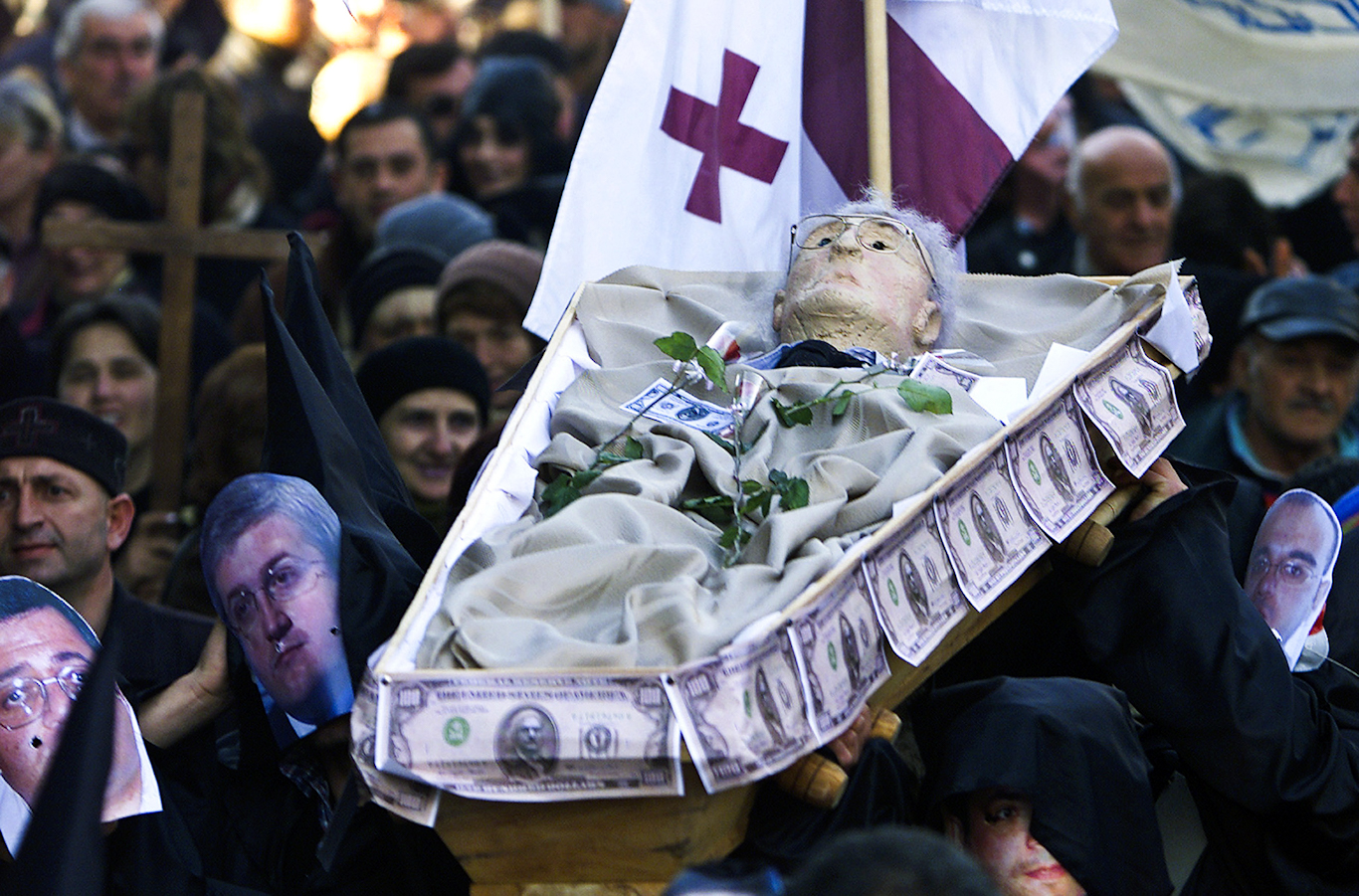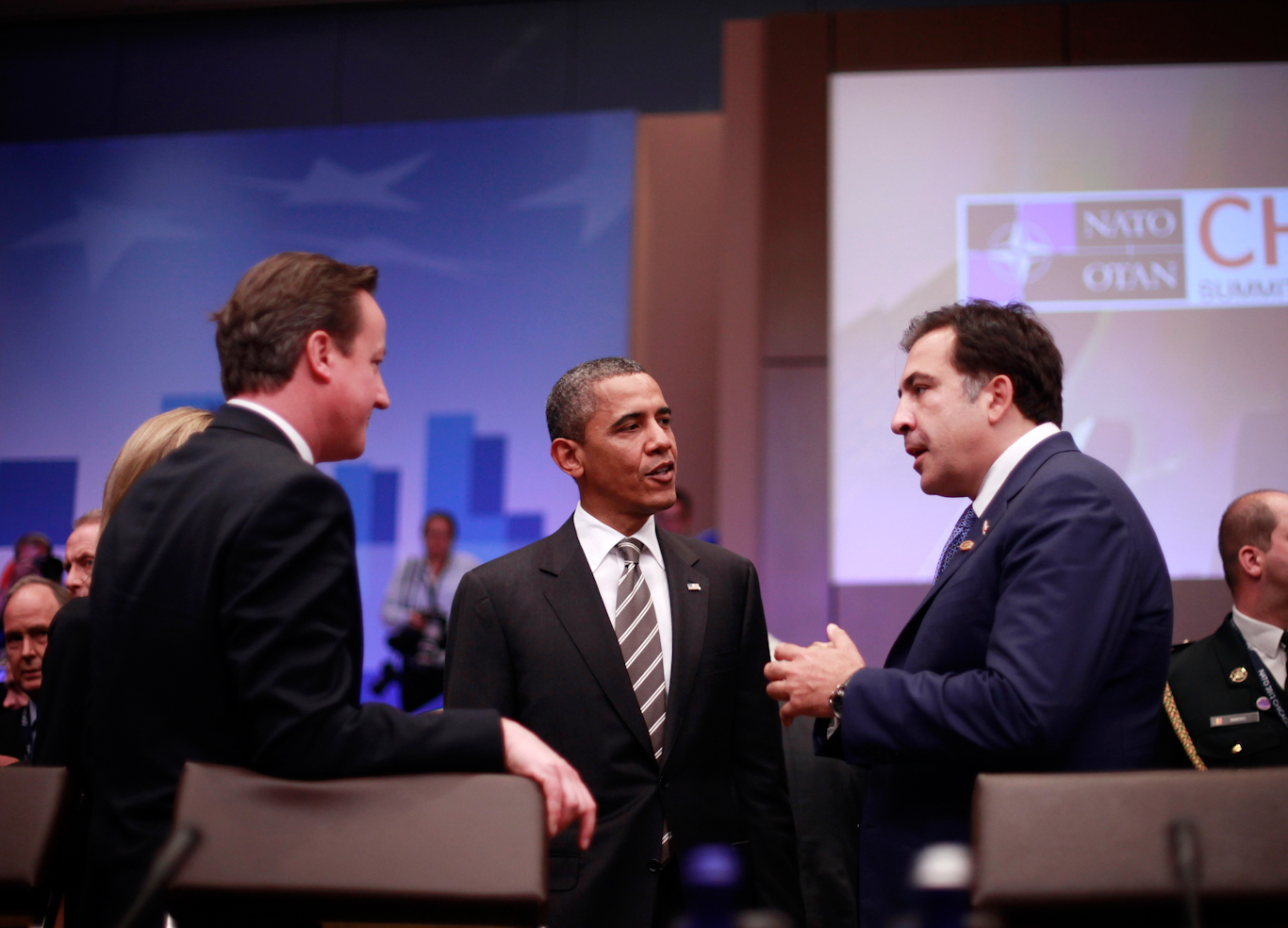In the second week of March, thousands took to the streets of Tbilisi, Georgia, to vent their fiery indignation over a draft law requiring any NGO operating in the country that receives over 20% of its revenue from overseas to register as a "foreign agent."
Violently clashing with police, daubing anti-Russian graffiti on virtually every available vertical surface, chanting mutinous, belligerent slogans, and prominently displaying the flags of the European Union, Georgia, and Ukraine, these widely-reported scenes were complemented by a never-ending soundtrack of hostile commentary from E.U. and U.S. officials.
Calling upon Georgian parliamentarians to "drop" the proposal, notorious war hawk and USAID chief Samantha Power inexplicably proclaimed that the new law "gravely threatens Georgia's Euro-Atlantic future and the ability of Georgians to fulfill their own economic, social, and other aspirations."
U.S. State Department spokesperson Ned Price menacingly warned any Georgian MP who dared vote for the foreign agent law, they would be personally responsible "for potentially jeopardizing Tbilisi's Euro-Atlantic future." He went on to declare the legislation was "not consistent" with "the future [Georgians] have set out for themselves, and the future that we, as the U.S., are determined to continue to be a partner to help them achieve."
Washington vehemently opposing the foreign agent law is unsurprising. Thousands of organizations, including media outlets and rights groups in Georgia, have received funding from the National Endowment for Democracy (NED) and U.S. Agency for International Development - which Power now incidentally leads - over the past three decades. Any reform that would further expose this hardly hidden but little acknowledged or understood fact might raise difficult questions about the independence of these entities and the sinister purposes they serve evermore.
That these organizations have a vested interest in keeping their U.S. financing under wraps was amply demonstrated by their pronounced presence at the forefront of the protests in Tbilisi. Many staffers at NED-funded NGOs also took to social media to shriek disapproval of the prospect of having to disclose their foreign funding - despite their employers in some cases already doing so voluntarily anyway.
As luck would have it, right when the thousands gathered outside Tbilisi's parliament building appeared on the verge of storming the building, the Georgian government scrapped the foreign agent law. What accounts for the protesters' visceral aversion to having to openly admit their relationship with NED by law?
The Endowment was founded in 1983, after U.S. intelligence agencies became embroiled in a number of embarrassing, highly public scandals. Then-Central Intelligence Agency chief William Casey was central to its creation. He wished to construct a public mechanism for funding opposition groups, media outlets and other anti-government agitants overseas that could be weaponized to destabilize and depose enemy governments, previously the CIA's exclusive clandestine preserve.
The NED represents a highly insidious, yet almost entirely overt, mechanism with which, at any time it wishes, the U.S. empire can bring foreign governments to heel, should they veer even slightly from a Washington-approved path in all matters domestic and foreign, and if necessary, overthrow them outright. Georgia's 2003 "Rose Revolution" provides a practical, real-world demonstration of how.
CIA Funds Graffiti Artists
Upon launch, the NED quickly set about killing off Communism in Eastern Europe, supporting activist movements such as Poland's Solidarity. Yugoslavia nonetheless remained stubbornly impervious to the agency's meddling until the turn of the century. In December 2000, a Washington Post investigation spelled out in extraordinary detail how a seemingly spontaneous, grassroots rebellion that at long last ousted the country's President Slobodan Milosevic two months earlier was, in fact, secretly funded and directed by the CIA front.
U.S. advertising professionals who typically marketed chewing gum and soda pop were engaged to concoct catchy slogans, PR stunts, and other innovative communications approaches to undermine Milosevic. Extensive opinion polling and countless focus groups were conducted behind the scenes to road test and perfect campaign strategy in advance and real-time. Meanwhile, scores of parliamentary candidates and activists were covertly coached in the art of staying "on message" to field journalists' questions and effectively rebut arguments of Milosevic supporters.
Extensive training and support were also provided to the student activist collective Otpor (Serbian for "Resistance"). They learned how to organize strikes, communicate publicly via symbols, "overcome fear," and undermine government authority through other disruptive, non-violent means.
USAID provided 5,000 cans of spray paint for student activists to daub anti-Milosevic graffiti across the country, but Otpor also employed "a wide range of sophisticated public relations techniques, including polling, leafleting and paid advertising" on Washington's dime. All their messaging was informed by U.S.-financed polling too, which meant "at every moment, we knew what to say to the people," one of the group's activists boasted.
"Our idea was to use corporate branding in politics. The movement has to have a marketing department. We took Coca-Cola as our model," an Otpor leader revealed in 2005.

In all, tens of millions of dollars were both overtly and covertly committed to the anti-Milosevic push by the CIA, NED, USAID, and other U.S. government agencies, all in just a year. At the time, the population of what remained of Yugoslavia was roughly 10 million, meaning several dollars were, in effect, allocated for every citizen.
Given the average monthly wage in the country was reportedly less than $30, this wellspring went very far indeed, and regime change foot soldiers were easily recruited. Proportionally and in reverse, it would amount to Belgrade spending billions to influence a U.S. election - not that that would've been remotely legal or tolerated by Washington, of course.
Such was the surging success and mainstream visibility of Otpor; the group began developing a game, A Force More Powerful. Players would learn how to oppose "dictators, military occupiers and corrupt rulers using methods that have succeeded in actual conflicts" via 12 separate scenarios "inspired by recent history." Intended "for use by activists and leaders of nonviolent resistance and opposition movements," it was hoped the media and public alike would more widely be educated in the art of revolution.
Released in March 2006, over the intervening years, Otpor's revolutionary blueprint was repeatedly exported the world over, courtesy of NED. The first stop on their international tour was Georgia.
cdn.iframe.lyEnough is Enough...
A veteran Soviet apparatchik and senior figure in Georgian politics for many decades, who had governed the country on and off since the early 1970s, Eduard Shevardnadze was a key reformist figure in Mikhail Gorbachev's government. As Foreign Minister, he played a significant role in ending the Cold War. Among other things, he ended the war in Afghanistan, greenlit the reunification of Germany, withdrew the Red Army from Europe, and negotiated nuclear arms treaties with the U.S.
In many ways, Shevardnadze was Washington's choice for Georgian President, and his elevation to power in 1992 furthermore came against the backdrop of a bloody civil war, which pitted the newly-independent republic's under-equipped army against bitterly determined Russian-backed breakaway movements in Abkhazia and South Ossetia. This immediately put him at significant odds with the Kremlin, and relations between Moscow and Tbilisi remained generally poor under his rule.
By contrast, he enjoyed an extremely warm relationship with Western governments. The large-scale privatization he oversaw enriched American and European oligarchs, while changes to the civil code in 1997 opened the door to the creation of thousands of foreign-funded NGOs. Very quickly, Tbilisi became among the largest beneficiaries of U.S. financial and military aid anywhere in the world. By the end of the decade, Shevardnadze had signed a strategic partnership with NATO and made clear his desire to join the EU.
When George Soros visited Tbilisi to establish a local Open Society Foundation branch in 2000, he was welcomed as Shevardnadze's personal guest. During his stay, he also met then-Georgian Justice Minister Mikheil Saakashvili, a graduate of elite U.S. universities - including Columbia, where he studied on a State Department-funded scholarship.
Not long after, the young Saakashvili dramatically quit his post and founded a political party, National Movement, with Open Society support. Existing Soros funding to opposition media, including TV network Rustavi-2, also intensified, and so did these outlets' critical output on Shevardnadze, which took the form of both satirical cartoons featuring a crooked animated president and intensive investigations into state corruption. In February 2003, Soros "began laying the brickwork for the toppling" of Georgia's government decisively, according to The Toronto Globe and Mail.

Georgian activist Giga Bokeria, founder of the NED and Open Society-backed Liberty Institute, was sent to meet with Otpor. Then, Otpor representatives were flown to Tbilisi, where they taught thousands how to peacefully overthrow Shevardnadze and form a revolutionary group of their own. Known as Kmara (Georgian for "Enough"), it borrowed heavily from Otpor's branding and messaging. Sizable NED and Open Society funding flowed instantly.
This cash injection helped Kmara develop a variety of campaign products and strategies in the lead-up to Georgia's November 2003 elections. In the ten days before the vote, Rustavi-2 repeatedly broadcast Bringing Down a Dictator, a U.S. documentary on the overthrow of Milosevic.
"Most important was the film," a National Movement representative later remarked. "All the demonstrators knew the tactics of the revolution in Belgrade by heart because they showed the film... Everyone knew what to do. This was a copy of that revolution, only louder."
The election was ostensibly won by a coalition of pro-Shevardnadze parties. Immediately - and according to some reports, before voting was even over - exit polling commissioned by the NED began to circulate, suggesting the official result was fraudulent and the opposition had, in fact, clearly won. Scores of anti-government activists from across the country duly descended upon Tbilisi's parliament building, ferried on buses paid for by Kmara.
Outside, loudspeakers and a cinema screen were erected to broadcast Rustavi-2, the most prominent disseminator of the NED counter-polling, and footage of the young protest leaders at work. Nationwide demonstrations, led by Kmara, raged for weeks, culminating on November 23, with activists storming parliament brandishing roses. The very next day, Shevardnadze resigned.
A 'Terribly Disappointing' Revolution
Saakashvili became President in January 2004. Over the next decade, he further "liberalized" Georgia's economy and sped up the privatization of remaining state industries, led wide-ranging anti-corruption efforts, and increased defense spending to a staggering 9.2% of GDP.
U.S. officials, as well as groups such as Transparency International and the World Bank, hailed Saakashvili for making Georgia one of the easiest countries to do business and growing the economy by 70% from 2003 - 2013, a period in which per capita income roughly tripled. Yet, even the U.S. empire's in-house journal Foreign Policy has conceded the results of the "Rose Revolution" were "terribly disappointing." Far-reaching change "never really materialized," and "elite corruption still continued apace."
By the time Saakashvili left office, poverty in Georgia had only marginally declined, and roughly a quarter of the population still lived below the absolute poverty rate. What's more, the country was no less authoritarian nor more democratic. In fact, his rule was dictatorial in many ways that Shevardnadze's was not.
For example, he replaced "superpresidential" institutions with even more highly concentrated "hyperpresidential" mechanisms, granting him unilateral power in key areas. Using this authority, Saakashvili attempted to ban political parties opposed to his policy agenda, among many autocratic maneuvers.

More gravely, questions abound also about his involvement in several suspicious deaths, such as Prime Minister Zarub Zhvania. He is known to have directed Georgia's security service to assassinate rivals, such as oligarch Badri Patarkatsishvili, and at his behest, prisons became politicized hotbeds of torture and rape. The country's inmate population quadrupled during his tenure to 25,000, more per capita than any other European state.
Despite Saakashvili's best efforts to rig the October 2012 election (efforts that were actively assisted by NED), he lost power, and a coalition led by Georgian Dream has governed the country ever since. Domestic critics - including Endowment-funded Shame Network, which was among the vanguard of the recent uprising - and overseas supporters of Kiev accuse the party of being pro-Kremlin.
In reality, though, the Georgian Dream has always struck a delicate balancing act between strengthening Western ties, pushing for E.U. and NATO membership, and maintaining civil coexistence with Moscow. This has become ever-harder to preserve in the wake of Russia's invasion of Ukraine, with Western pressure on Tbilisi to impose sanctions on its far larger, richer and more powerful neighbor - one of the country's biggest trading partners by far - and to send arms to Kiev constantly mounting.
The government has so far refrained from either, although strives to comply with U.S. and European sanctions regimes and has condemned the invasion at the U.N. In December 2022, Prime Minister Irakli Garibashvili claimed he had been repeatedly asked to open a "second front" since February 24 that year by Kiev, and his refusal was not warmly greeted.
All-out conflict is, understandably, something Tbilisi wishes to avoid, not least due to the brutal routing it suffered in August 2008's Russo-Georgian War, which began when Saakashvili, with U.S. encouragement, began striking civilian positions in Abkhazia and South Ossetia. Despite lasting just five days, as many as 200,000 were displaced, and hundreds were killed.
One can only speculate whether Georgian Dream specifically pursued the foreign agent law in order to prevent the NED-sponsored installation of a government more amenable to opening a "second front" and imposing sanctions on Russia.
Dare Call It A Coup?
To put it mildly, the fingerprints of the NED and USAID were plastered all over Ukraine's February 2014 Maidan Coup. At every stage of the "revolution," individuals and organizations funded by both entities featured prominently.
Two years prior too, Oleh Rybachuk, who ran several USAID-funded opposition groups for years in the leadup to Maidan, made his insurrectionary intentions very clear, saying of the "Orange Revolution" in Kiev a decade prior, "we want to do that again, and we think we will." In May 2014, George Soros told CNN his Open Society Foundation had "played an important role in events" relating to Maidan.
However, contemporary media reports on Maidan either ignored the unambiguous U.S. role in fomenting it or dismissed the proposition as Russian "disinformation" or conspiracy theory. Ever since the conflict in Ukraine began, Western journalists, have become even more aggressive in rejecting all suggestions the upheaval was anything other than an overwhelmingly - if not universally - popular public revolt. Mainstream reports boasting of Washington's role in the overthrow of Milosevic, Shevardnadze et al. have apparently been memory holed.
This mass amnesia may be attributable to an increasing level of hostility towards the NED and USAID the world over and moves by governments - particularly those with which Washington has a particular animosity - to restrict or outright ban them. The reality of their raison d'etre and modus operandi has resultantly not only become unsayable but must be vehemently denied by Western journalists.
After all, admitting what enemy state leaders say is true is not done. Representatively, a July 2015 Guardian report on Moscow's proscription of the NED under its foreign agent laws quite amazingly relied on a brief quote pulled from the organization's own website to describe its operations. By contrast, in November 2004, the same outlet published an extensive account of how that year's "Orange Revolution" in Ukraine was wholly orchestrated by the Endowment and USAID.
In the modern day, allegations of foreign interference in politically-charged unrest overseas are almost invariably countered in the mainstream by appeals to protesters' "agency" and "legitimate grievances." In the context of the incendiary sequence that recently played out in Tbilisi, such entreaties ring entirely hollow. It is completely inconceivable such righteous concern over a comparatively trivial regulatory amendment, in direct keeping with the condemnations and pronouncements of U.S. officials, stirred organically.
For now, though, the regime change coast is clear again, the protests seemingly a mere warning shot. That the government capitulated so readily surely reflects its cognizance of the dire risk of an outright revolution breaking out, courtesy of NED-sponsored assets on the ground, if its arm had not been twisted. While the empire has been placated, though, that threat has not gone anywhere. It will remain a daily, existential hazard as long as NED operates in Tbilisi.
Feature photo | A man waves a Georgian national flag in front of a burning barricade as other protesters stand behind not far from the Georgian parliament building in Tbilisi, Georgia, March 9, 2023. Zurab Tsertsvadze | AP
Kit Klarenberg is an investigative journalist and MintPresss News contributor exploring the role of intelligence services in shaping politics and perceptions. His work has previously appeared in The Cradle, Declassified UK, and Grayzone. Follow him on Twitter @KitKlarenberg.